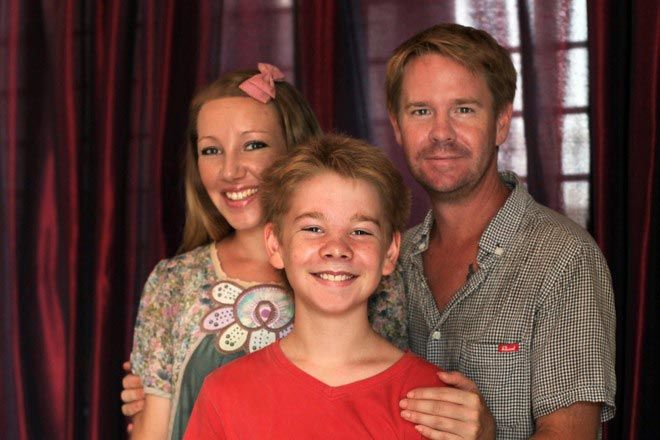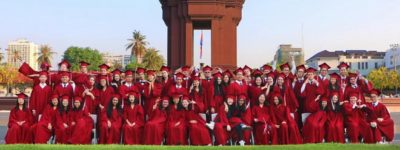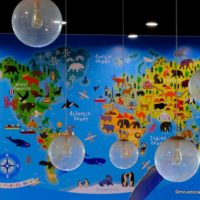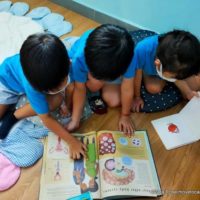In this series we talk to Cambodia expats about what they know now that they wish they had known before they moved to Cambodia.

Jacqueline, James and Ben moved to Siem Reap in January.
This week we hear from Ben Bartlett, who together with his wife Jacqueline and 12-year-old son James moved from Australia to Siem Reap in January of this year. Ben and Jacqueline have a unique expat experience in that they moved here with their son James whom they educating using an Australian distance learning program. In this Expat Q&A they talk about the the joys and difficulties of being an expat family in Cambodia.
MTC: Ben, what do you know now that you wish you had known before you moved to Cambodia?
I wish I knew how much I would love the challenges of living as a minority in a foreign land. I vaguely recognised moving here would be difficult and some days would be harder than others. We knew James would have to adapt to very strange circumstances and that we were placing a lot of trust in the strength of our family to survive stressful situations. In saying that I can only say the experience has been fantastic for us–spending everyday together, dealing with the issues together and becoming a closer family. The best discovery from living in Cambodia is the strength of family, something the locals teach us every day, and something we may never have found in Melbourne.
Before moving Cambodia I also wish I knew how unforgiving distance education is for our son, and for us! My wife and I both worked a minimum of 12 hours a day in stressful roles. Our son was in year 6 at the local primary school and by the end of 2012, was walking the one block to school and the one block home alone, letting himself in as a latchkey kid. Our parental guilt was sky high, our existence was very unfulfilling, and we were like three ships passing in the night. We decided that this was not the life we wanted to be living. Having travelled to Cambodia three times over the past two years and falling in love with the people, we packed up the house.
Being parents of a 12-year-old boy, James’ schooling was our number one concern. We were intent on finding a means for James continuing his curriculum for year 7 that would be recognised in Australia, so that he could proceed to year 8 upon return. We knew of a school in Phnom Penh that offered the International Baccalaureate but the fees were astronomical and well out of our price range. Eventually my wife Jacqueline found an accredited Victorian State government program for distance education, the same curriculum taught at our home schools.
The program requires weekly submission for seven subjects and a one hour online classroom session. It is very structured learning so we have weekly ‘packs’ to simply work through. There is a support teacher assigned to each child and regular email contact with teachers, and skype communication with other students. We really enjoy the program and think it is a fantastic tool for those far from school, be it for medical reasons, difficulty with mainstream education, or simply travel, as in our case. Our son is a good student and is self-motivated so it has been a fairly easy transition. It has also been made easier by our different skill sets, as I supervise Maths, Science, and Health & Physical Education whilst my wife supervises English, Humanities and Art. We share teaching Discovery Learning, which is essentially a project management subject.
The positives of our approach have included being totally involved with our child’s learning. Last year we knew the basic list of topics he was learning at a term level, but no details, with only two school reports a year to work out where he was at. This year, we have full comprehension of his learning styles, his strengths, his weaknesses, a deeper sense of his likes and dislikes. We get to discuss important social and political issues, to visit historical events from different perspectives, to piece together threads from multiple disciplines and experiences. The teacher-student ratio is pretty good at 2:1, not 1:30+ in a regular school! There are no school uniforms to wash and iron, no school lunches to pack, no permission forms to fill out. Best of all, we get to spend quality time with our son, at least before he reaches full teenage years when he may not want to talk to us, let alone associate with us! In all honesty, it has been a pivotal point in our relationship, at precisely the right time!
It has not been all rose-coloured glasses though! We did not expect the amount of time studying would take each day. We thought that kids in Australia go to high school from 9 a.m. to 3.30 p.m. with half an hour for recess and an hour for lunch, and with classroom changes and assemblies, leaving about 4 hours actual learning time. We spend about 6-7 hours a day, one to one learning, 5 days a week. Add an extra 6 hours of Khmer lessons a week and education is our key occupation in Cambodia!
What we did not expect, above all, was the isolation for James. We thought that James would have loads of kids to play with, and he does, but the neighbouring kids in our community are a lot younger than he is. There is an obvious lack of kids aged 12 and 17 years. Just walking to town we see hundreds of children every day. It’s difficult to accurately gauge the age of Khmer kids but they seem either younger than James or old enough to drive motos. We presume that they are either working to provide an income for their families or old enough to hang out with their friends. Similarly, we thought there would be many expat families doing what we were doing, and maybe there are, and we have just not met them yet. At this point we are glad that James is happy to hang out with his parents, and with entertain visitors from Australia, he has not complained (yet). People have said to us that it is ‘character building’, so we will see how that works out in the long run!
I wished that we knew how hard it would be to source school supplies and had received our yearly curriculum before we left Australia. We could have brought certain books to escape the exorbitant postage of an atlas, dictionary and reference books. We could have stacked our suitcases with science supplies, perhaps even smuggled in a bunsen burner! My memory of science classes twenty years ago comprised of burning, boiling and blowing stuff up! Science has proved particularly difficult, especially with an accident with our school supplied thermometer, which cracked spectacularly on our tile floors, rendering that assignment unable to be submitted. Bi-carb soda supply was stumped briefly, as was food dye, but we are on track again, and luckily there is a constant supply of matches and sultanas here!
Distance education provides us with the opportunity to travel, and with a laptop and an Internet dongle, we are truly free! With our army jeep and a map, we have given lessons in southern Cambodia, atop a mountain at Bokor Hill on Ancient Sumerian civilisations, at Koh Tonsai (Rabbit Island) we have explored literature themes of plot, character and conflict, and locally in Siem Reap, we have sat by the pool critiquing Salvador Dali paintings. Above all, we feel that James will have a truly grounded education through travelling: by seeing how other people live, by experiencing other cultures, and by developing a broader world view. We are looking forward to travelling though Laos and Thailand in the next few months, and hope that the wonder of what we see is reflected in his school work over that period. So far, we have felt the ups and downs of living life here but at the end of the day, we are living life and not just existing. The opportunity of being a part of our son’s education is an every day joy.
Life back in Melbourne consisted of demanding jobs and diminishing time at home. Life was easy with the daily work routine, coming home of an evening, passing a carefree eye across James’ school work, a lazy ear to his adventures, blaming the school for not doing enough and going to bed. In hindsight leaving these educative years in the hands of others was naive and lazy on our behalf. I am so proud of how we have engaged in James’ schooling and his life, something I could never see before we relocated. We have acquired a new level of patience and how to communicate with one another. Learning has become more than the supplied school lessons and good manners, now we actually talk about all aspects of daily life including decisions, interactions, cultural differences and adapting to different ways of thinking.
I also wish I knew about Dengue Fever (the band) earlier!





Could anyone help me to find a nanny for my 8 months old son and a house help?
Anish, you might want to try in one of the Siem Reap expat groups on Facebook, we have them listed in our Web Resources section: https://movetocambodia.com/for-more-information/web-resources/